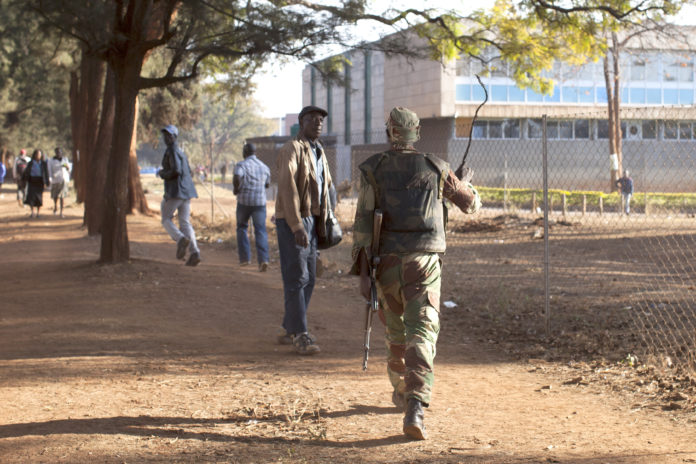Harare — Closer to a month after government foiled street protests, 24-year old Benson Chomuruva, a resident of Harare, the Zimbabwean capital, still winces because of injuries sustained from beatings by the country’s detectives who accused him of staging an unsanctioned demonstration.
But, when he was picked by cops, Chomuruva claimed he was only seated outside the gate of his house basking in the sunshine with his friends.
On the day of the protests, still in Harare, police also arrested Tsitsi Dangarembga, a Zimbabwean novelist who had decided to join the anti-government march.
She (Tsitsi) was charged with inciting public violence.
Yet, Zimbabwe’s Section 59 of the constitution allows peaceful demonstrations, which many like Benson only dream of enjoying.
“I’m not an activist, but still I can’t even risk watching demonstrations as they happen because police would beat me up even when I am within the vicinity of my home. I was arrested and beaten before; I don’t want that experience again,” Benson told Ubuntu Times.
As such, in Zimbabwe, fear of the government is growing every day.
For many like Jacob Ngarivhume, Zimbabwe’s opposition Transform Zimbabwe, now behind bars for inciting public violence after he made calls via social media for people to protest against the government, the right to freedom of speech seems long gone.
Yet, Ngarivhume had made frantic calls on Twitter for people to join the Jul.31 anti-government protests.
Civil society activists here have weighed in, blaming the Zimbabwean government of fueling human rights abuses.
“We are witnesses to the serious human rights abuses that the Zimbabwean government is perpetrating against its own people and now there is nothing like rights to talk about under Mr. Mnangagwa’s government,” Owen Dhliwayo, a civil society activist here, told Ubuntu Times.

Moved by the rights abuses here, in a rather frank letter to the Zimbabwean government, Catholic Bishops said ‘the country was suffering from a multi-layered crisis, including economic collapse, deepening poverty, corruption, and human rights abuses.’
“Fear runs down the spine of many of our people today. The crackdown on dissent is unprecedented. Is this the Zimbabwe we want? To have a different opinion does not mean to be an enemy,” read part of the Catholic letter addressed to the Zimbabwean government.
But, the Zimbabwean government has vehemently refuted claims of the existence of human rights abuses in the country, choosing rather to spew attack on the Catholic prelates.
Reacting to the Catholic Bishops’ letter, Zimbabwe’s Information Minister Monica Mutsvangwa, said ‘its evil message reeks with all the vices that have perennially hobbled the progress of Africa.’
“It trumpets petty tribal feuds and narrow regionalist agendas so that it can sow seeds of internecine strife as a prelude to national disintegration,” charged the Zimbabwean Minister.
Ironically, to this, government earned a drubbing from one of its own commissions- the Zimbabwe Human Rights Commission (ZHRC), which rebuked the regime about its violation of human rights.
“ZHRC calls upon the government of Zimbabwe to respect, protect, promote and fulfill all the rights enshrined in the Declaration of Rights as provided for by section 44 of the Constitution,” said the Southern African nation’s statutory body in a statement.
ZHRC is one of this country’s five independent commissions provided for under section 232 of the Constitution to support and entrench human rights and democracy in particular.
Nevertheless, even before conviction, journalist Hopewell Chin’ono who has reported intensively on corruption and human rights violations in Zimbabwe, and politician Ngarivhume, languish at Chikurubhi maximum jail as the State continues to deny them bail.
On the streets across towns and cities here, armed soldiers have become common features working alongside police, ready to thwart any anti-government protests.
To many like Benson, ‘the site of armed soldiers is chilling even as government claims to be maintaining order.’
Like ZHRC, human rights defenders like Claris Madhuku who heads the Platform for Youth Development has not minced his words in implicating the government in the country’s worsening human rights record.

“Former President Robert Mugabe did worse things in terms of violating human rights, but the current regime has done the worst because now it heavily relies on the military to quell anti-government protests much as it relied on the same when it came to power,” Madhuku told Ubuntu Times.
For many jailed journalists like Chin’ono, even his right to legal representation has been snatched away from him by the Zimbabwean government, this after his lawyer Beatrice Mtetwa was barred from representing him.
This, prominent Zimbabwean law lecturer Alex Magaisa at Kent Law School at the University of Kent in the United Kingdom, has branded ‘lawfare’ being used by the Zimbabwean government to silence opposition.
“It is lawfare in which law is a weapon used by the Mnangagwa regime to suppress citizens. Dictatorships rely on a combination of guns and the law. They engage in warfare against citizens and bludgeon dissenters into submission,” Magaisa said recently in his weekly column called Big Saturday Read found on his blog.
But, to this also, ZHRC said it ‘calls upon the government to safeguard and advance human rights as dictated by international human rights’ law and the obligations imposed by treaties and conventions Zimbabwe is party to.’
Meanwhile, ordinary Zimbabweans like 76-year old Tinago Marweyi, a resident of Highfield high-density suburb in Harare has had no kind words for government here which he has accused of turning on its own citizens.
“My son, we now live in fear of our own government more than thieves and robbers because if we raise our voices complaining about anything that we think government is messing up, we are treated as traitors. Colonial governments here were better than what we see under Mnangagwa,” Marweyi told Ubuntu Times.

